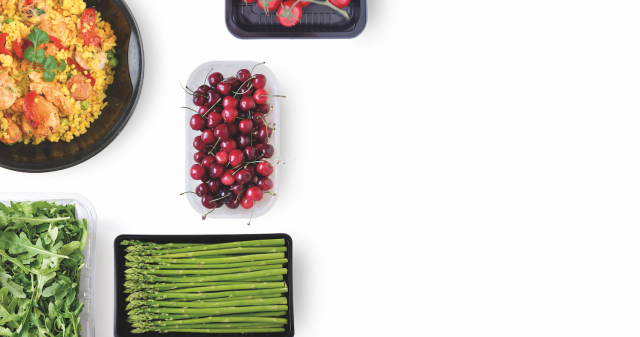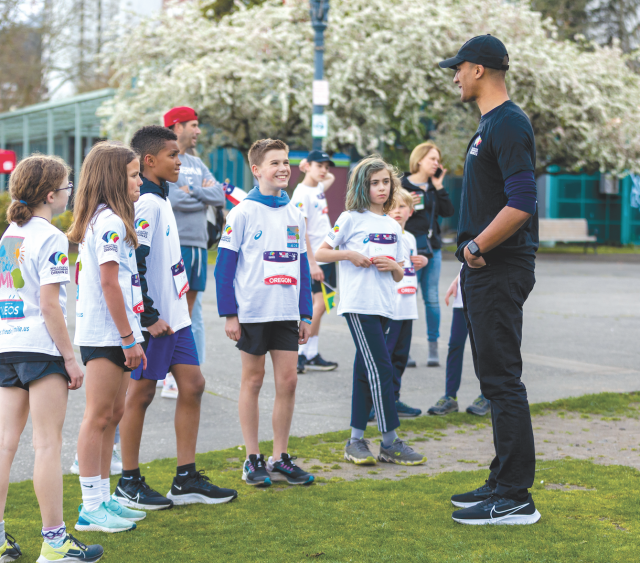INEOS INCH ISSUE 23
Also
-
Grenadier – ORDERS NOW OPEN
INEOS’ no-nonsense Grenadier 4X4 is now on sale to the public.
-
INEOS gets cracking
The Province of Antwerp clears way for INEOS to build state-of-the-art ethane cracker
-
Programmes, partnerships and philanthropic donations
OVER the past five years INEOS has committed almost £225 million to charitable causes.
Scroll Down
-
Impossible is not a word you hear very often in INEOS.
At Eliud Kipchoge, the first man on earth to run a marathon in under two hours, isn’t alone in his belief that no human is limited. In this edition of INCH, INEOS once again shows that it thrives because it is willing to invest. In people. In ideas. In projects others dismiss as impossible.
It is just another example of the mindset that runs through the heart of this extraordinary company. In 2015, INEOS made history by shipping ethane – from US shale gas – to Europe. A feat that many believed was impossible. But it is not only in the world of chemicals that INEOS continues to lead from the front.
INEOS’ no-nonsense Grenadier 4X4 is now on sale to the public. It’s another major milestone in a journey that’s gone from a chat in a pub in London to full production at our factory in Hambach. A journey seen as a huge challenge throughout the automotive industry.
INEOS Sport has brought together some of the best talent in global sport across Formula One, cycling, sailing, football, running and rugby.
Over the past five years alone, it has committed almost £225 million to charitable causes.
Thanks to INEOS, scientists are currently researching new, life-saving antibiotics to ensure we are not plunged back into the dark ages, experts are working how to save the Icelandic salmon from extinction and headteachers are involved in a radical scheme to try to tackle the root causes of poor performance in primary school children from deprived homes.
And to top it all, The INEOS-backed Daily Mile is celebrating its 10th anniversary.
-
Grenadier – ORDERS NOW OPEN
Engine choice, paint colours, our Belstaff editions. Customers are now able to configure their vehicle to their precise specification, price it up and place an order - all at ineosgrenadier.com
It’s another major milestone in a journey that’s gone from a chat in a pub in London to full production at our factory in Hambach. A journey seen as a huge challenge throughout the automotive industry.
Order books are now open for Europe and other key launch markets. The USA, Canada and Mexico will follow by the end of this year, with first deliveries in 2023. For further information please visit: ineosgrenadier.com
*Order books for USA, Canada and Mexico will open late 2022.
-
The final mile...
As INEOS Automotive heads towards getting the vehicle into customers’ hands, we asked six familiar faces from the world of INEOS sport to put our rugged 4X4 through its paces on five final testing challenges.

TOTO WOLFF
Alpes-Maritime, Southern FranceAs Team Principal and co-owner of the Mercedes-AMG Petronas F1 Team, Toto has clinched eight consecutive Formula One Constructors' Championships and seven consecutive Drivers' Championships. So, he clearly knows a thing or two about putting together a successful vehicle. He gunned the Grenadier around the mountains above Nice. Tackling rocks, snow, gravel trails and muddy tracks alongside co-pilot, INEOS Automotive CEO, Dirk Heilmann. They discussed bringing like-minded engineering partners, suppliers and specialists together, pushing to get the maximum out of a vehicle, and overcoming challenges to reach the end goal.
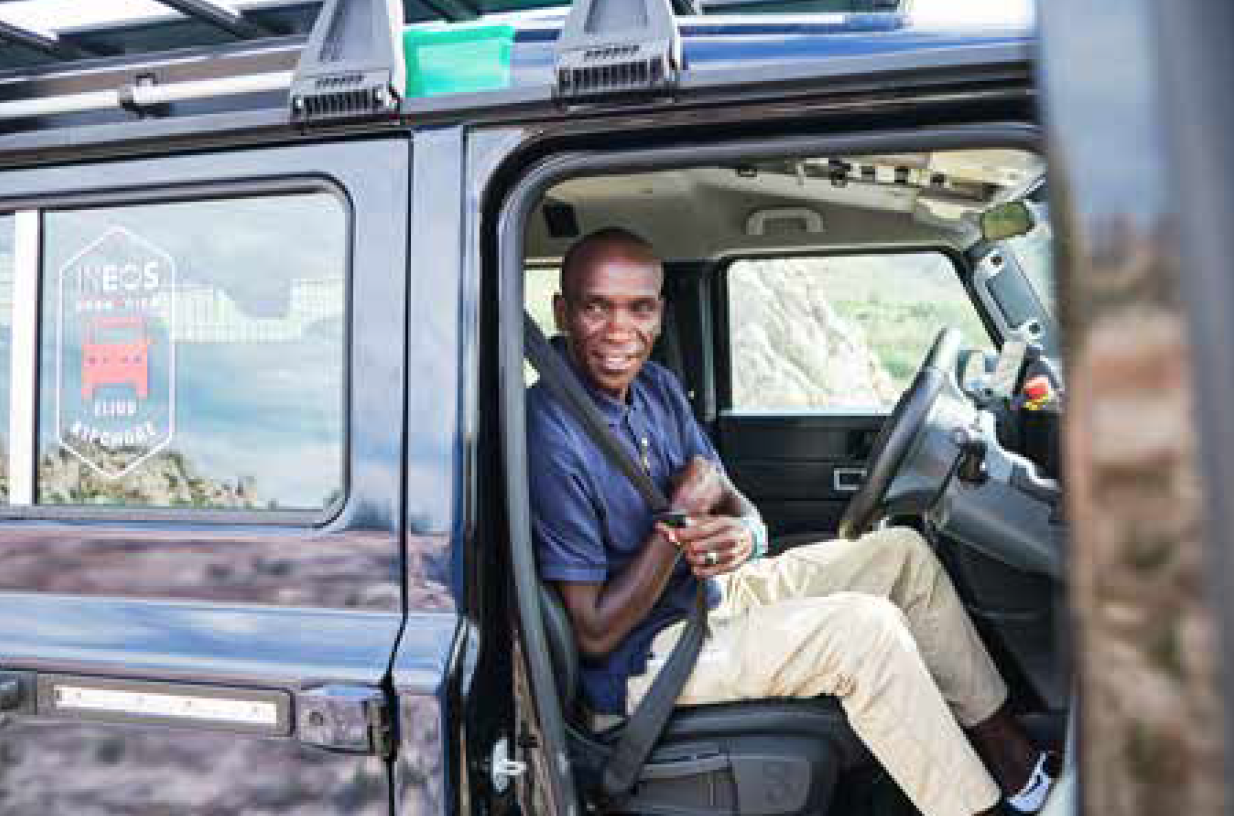
ELIUD KIPCHOGE
Western Cape, South AfricaWho better to test the Grenadier’s capability than the first human to run a marathon in under two hours? The double Olympic champion and marathon world record holder drove the tough terrain of Grabouw, then along Chapman’s Peak, one of the most spectacular coastal drives in the world. He was joined by Tim Abbott, Head of Region, Sub-Saharan Africa, INEOS Automotive, as he talked about driving in Kenya, how his training targets all types of terrain, and how impressed he was by the tyres, clearance, and stability of the Grenadier.

GEORGE RUSSELL
Camel Rock, United Arab EmiratesThis year, George joined the Mercedes-AMG Petronas Formula One team. And also tackled The Final Mile. Shifting gears for a drive in the spectacular sand dunes of the Arabian desert. A more leisurely pace than he’s used to, for sure, but he still had plenty of insight into how our vehicle performed. Gary Pearson, Head of Sales & Marketing UK and MENA, was onboard with him to discuss how putting vehicles through testing and analysing data makes the end product even better, dealing with the pressure of expectation, and how the Grenadier easily handled the sandy surface.

SIR DAVE BRAILSFORD + SIR BEN AINSLIE
UK, SnowdoniaSir Dave Brailsford is Team Principal of the INEOS Grenadiers cycling team and Director of Sport, INEOS. Sir Ben Ainslie is Team Principal and Skipper of INEOS Britannia. Both have a deep understanding of what it takes to push the limits of what’s possible. Both search for small incremental gains that add up to success. And both took the wheel to analyse the Grenadier’s performance in Wales’ mountainous Snowdonia National Park. They chatted about attention to detail, how vital testing is in both their sports, having belief that you can achieve the impossible, and pushing bikes, boats, and 4X4s to the limit.

ANDREW MEHRTENS
Fraser Island, AustraliaAndrew is a New Zealand international rugby legend. Widely regarded as one the greatest players the country has ever produced, he amassed nearly 1,000 points over 70 international appearances. For the Final Mile, Andrew swapped position from 5/8th to 4X4, to tackle the deep sand tracks of Fraser Island off the coast of Queensland. He was joined by Justin Hocevar, Head of Region APAC INEOS Automotive, to talk about how passion can drive any sport or industry, the tenacity you need to get better, and the comfort and ease of driving the Grenadier offered whatever they threw at it.
-
Grenadier x Belstaff
Named after two of Belstaff’s most iconic jackets, these no-nonsense designs perfectly echo our own purpose-driven principles. Founded in 1924, Belstaff has a rich history of developing products envisaged for both function and progress. Protective suits for race-car drivers so they had the confidence to go faster. Windproofed smocks for Marines to help them weather any storm. Insulating clothing for mountaineers so they could venture further. Belstaff have long been the chosen outfitter for independent spirits: from Amelia Earhart and T.E. Lawrence to Marlon Brando. Together, we share an appreciation of the journey there - wherever there might be.
THE TRIALMASTER
Cut from 6oz British Millerain waxed cotton and featuring both a slanted map pocket and an ergonomic pivot shoulder for improved movement, the Trialmaster was created in 1948 at the request of professional Trials biker and Irishman, Sammy Miller. It remains a covetable classic to this day.THE FIELDMASTER
Designed for life in the outdoors, the Trialmaster’s younger brother has a roomier fit, cropped body and more modern, functional styling – perfect for a day’s driving.GRENADIER TRIALMASTER
For the most extreme off-road conditions, the Grenadier Trailmaster Edition ensures there are no limits to adventure.
The Trialmaster Edition has been specified with extreme off-roading in mind. Whatever the terrain, the front and rear differential locks, BFGoodrich All-Terrain tyres, and raised air intake will keep you going. Secure your kit with the exterior utility belt or interior utility rails. And for plug and play capability, power up your equipment with the high load auxiliary switch panel and auxiliary battery.
Belstaff Trialmaster Jacket included.TRIALMASTER EDITION:
EXTERIOR FEATURES*
- 17” Steel Wheels
- Raised Air Intake
- Exterior Utility Belt
- Access Ladder
- Rough Pack
-- Differential Locks Front & Rear
-- BFGoodrich All-Terrain T/A KO2 tyresINTERIOR FEATURES*
- Interior Utility Rails
- Auxiliary Battery
- High Load Auxiliary Switch Panel & Electrical Preparation
- Compass with Altimeter
- Smooth Pack:
-- Rear-View Camera
-- Park Assist Front (PDC)
-- Power Heated Exterior Mirrors
-- Heated Windscreen Washer Jets
-- Central Stowage Box, Lockable
-- Puddle Lamps and Ambient Door Lighting
-- Auxiliary Charge Points
*In addition to Grenadier standard equipmentGRENADIER FIELDMASTER
For exploration and escapism without a fixed destination. The Grenadier Fieldmaster Edition gives drivers the option of anywhere.The Fieldmaster Edition has been specified for all of your adventures, on- and off-road. It brings comfort, style and refinement with interior leather, carpet floor mats and 17” alloy wheels. The heated front seats will keep you warm on cold days. And when the sun’s out, pop up or completely remove the safari windows for an open-air experience. Belstaff Fieldmaster Jacket included.
FIELDMASTER EDITION:
EXTERIOR FEATURES*
- 17” Alloy Wheels
- Locking Wheel Nuts
- Safari Windows
- Access LadderINTERIOR FEATURES*
- Leather Trim (Black or Grey/Black)
- Heated Front Seats
- Carpet Floor Mats
- Compass with Altimeter
- Smooth Pack
-- Rear-View Camera
-- Park Assist Front (PDC)
-- Power Heated Exterior Mirrors
-- Heated Windscreen Washer Jets
-- Central Stowage Box, Lockable
-- Puddle Lamps and Ambient Door Lighting
-- Auxiliary Charge Points*In addition to Grenadier standard equipment
GRENADIER PAINT COLOURS
- SOLID
- SCOTTISH WHITE
- MAGIC MUSHROOM
- ELDORET BLUE
- BRITANNIA BLUE
- SELA GREEN
- INKY BLACK
- METALLIC
- STERLING SILVER
- SHALE BLUE
- QUEEN’S RED
- DONNY GREY
-
INEOS investments
The big focus now is on achieving net zero by 2050 and INEOS is putting its money where its mouth is.
Thanks to approval from the Province of Antwerp, it can soon start building the most environmentally-sustainable cracker in Europe – a move that will set the standard for all steam crackers.
It has also struck long-term deals with three sustainable energy producers so it can drastically cut its CO2 emissions.
It continues to collaborate with innovative companies that share its vision of a world where all plastic becomes part of the circular economy – and is never wasted.
And even though the Acorn Carbon Capture and Storage project did not win UK government funding, from the first round, INEOS is pressing ahead with its plans to build a low-carbon hydrogen production plant at Grangemouth in Scotland.
Once built, it will not only help INEOS to reduce its emissions, but it will create products that will help others to reduce their emissions and allow INEOS to play a leading role in a clean hydrogen revolution.
These are exciting times – and INEOS is in the thick of it.
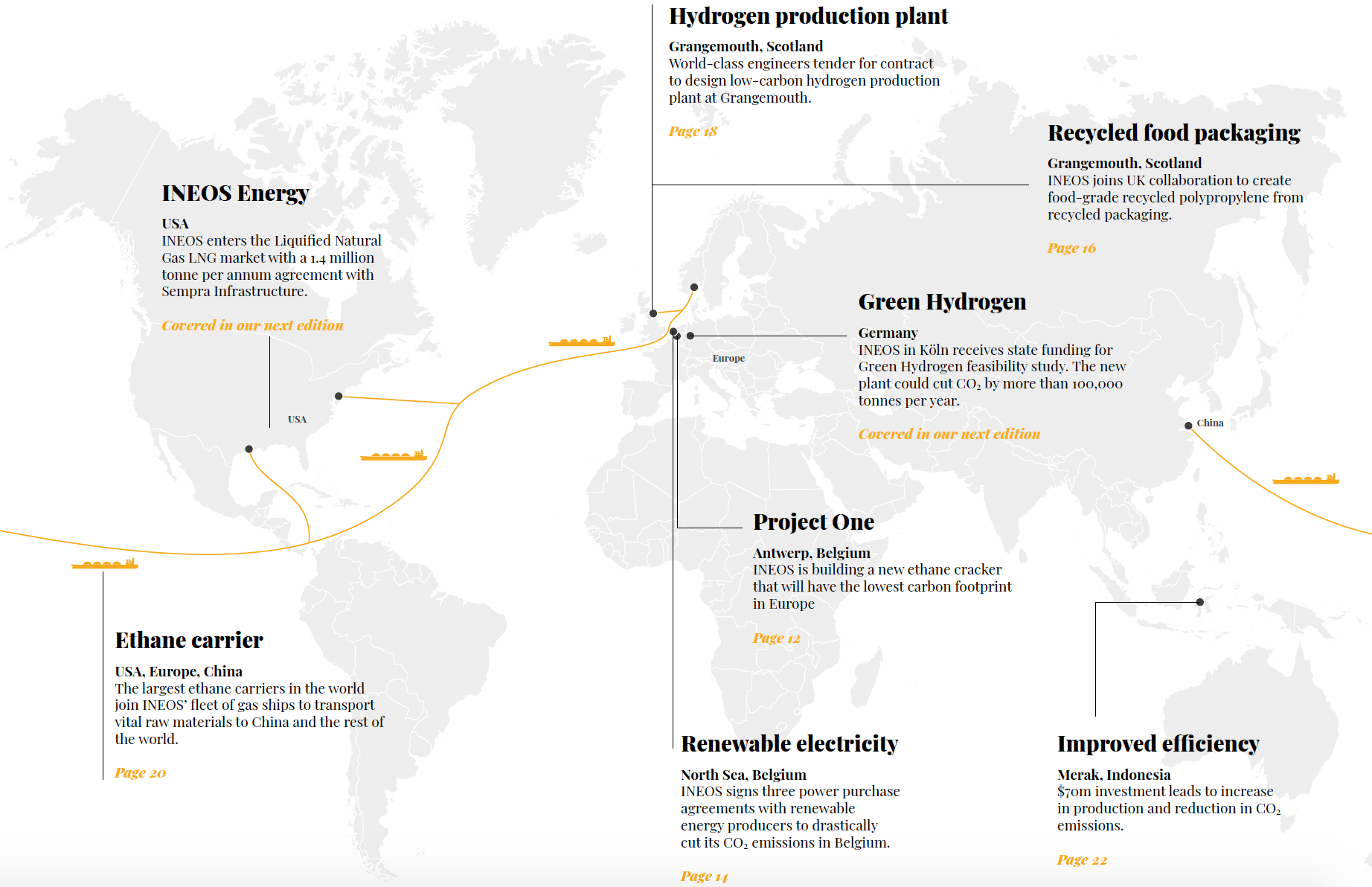 Green Hydrogen
Green Hydrogen
USA
INEOS enters the Liquified Natural Gas LNG market with a 1.4 million tonne per annum agreement with Sempra Infrastructure. Covered in our next editionEthane carrier
USA, Europe, China
The largest ethane carriers in the world join INEOS’ fleet of gas ships to transport vital raw materials to China and the rest of the world.INEOS Energy
USA
INEOS enters the Liquified Natural Gas LNG market with a 1.4 million tonne per annum agreement with Sempra Infrastructure.Hydrogen production plant
Grangemouth, Scotland
World-class engineers tender for contract to design low-carbon hydrogen production plant at Grangemouth.Recycled food packaging
Grangemouth, Scotland
INEOS joins UK collaboration to create food-grade recycled polypropylene from recycled packaging.Green Hydrogen
Germany
INEOS in Köln receives state funding for Green Hydrogen feasibility study. The new plant could cut CO2 by more than 100,000 tonnes per year.Project One
Antwerp, Belgium
INEOS is building a new ethane cracker that will have the lowest carbon footprint in EuropeRenewable electricity
North Sea, Belgium
INEOS signs three power purchase agreements with renewable energy producers to drastically cut its CO2 emissions in Belgium.Improved efficiency
Merak, Indonesia
$70m investment leads to increase in production and reduction in CO2 emissions. -
INEOS gets cracking
As part of project one, INEOS is building a steam ethane cracker that will have the lowest carbon footprint in Europe.
CONSTRUCTION of the most environmentally-sustainable cracker in Europe has been given the go-ahead – and INEOS is now poised to start work on it. The granting of an environmental permit by The Province of Antwerp cleared the way for INEOS to build its state-of-the-art ethane cracker on the bank of the River Scheldt at Lillo in Belgium.
- 2x More efficient than the best european cracker
- 3x More efficient than the average european cracker
- 5x More efficient than the worst european cracker
“The urgency of tackling the climate problem is now clear to everyone,” said John McNally, CEO of Project ONE.
“We do not want to stand on the sidelines as an industrial player. We want to make a fundamental difference as of today.”
The cracker will be built using the very best of today’s technology.
But it will also be designed so that it can take advantage of technologies that don’t even exist yet.
Construction is due to start in 2023 and could take up to four years.
Once work starts, INEOS will have to comply with some of the strictest environmental regulations in the world.
But the knock-on effect of the Project ONE cracker, which will have the lowest carbon footprint in Europe, will be felt throughout the region.
“It will set the standard for all steam crackers,” said Jonas Byns, lead process engineer in the cracker team of Project ONE.
The cracker will generate about one and a half million tonnes of ethylene – an essential chemical used in everything from cosmetics, textiles, computers, smartphones, household appliances to food packaging and medical applications.
But it will produce it with less than half the CO2 emissions compared to the current 10% of the best European crackers.
“If we compare the Project ONE ethane cracker with all other European crackers within the European Emission Trading System (ETS), we literally see the standard shifting,” said Jonas.
“The benchmark is determined by the 10% best-performing production sites. Once our ethane cracker is operational, it will affect the benchmark.”
He said that would either encourage others to make additional, sustainable investments or face hefty emission fines.
As it stands, Project ONE remains the largest investment in the European chemical sector in more than 20 years.
But INEOS hopes its €3 billion investment will help to strengthen the resilience of the European chemical sector in a global economy.
“Over the past 20 years, investments of this magnitude have gone primarily to regions such as China, the United States and the Middle East,” said John.
“INEOS wants to break that trend.”
The investment in the new plant in Antwerp – birthplace of INEOS more than 20 years ago – is expected to create 450 direct jobs and thousands of indirect jobs.
‘It will set the standard for all steam crackers’ - Jonas Byns, lead process engineer in the cracker team of Project ONE
-
Wind power
Sustainable
INEOS invest in three sustainable energy producers that will drastically cut CO2 emissions200MW
of clean energy secured over next ten years3 million
3 million tonnes CO2 reduction equivalent of taking more than 230,000 cars off the road each yearELECTRICITY, generated by the wind, is now being used to help run three of INEOS’ businesses. INEOS Olefins & Polymers, Styrolution and INEOS-owned INOVYN are all now using the renewable electricity, where they can, instead of fossil fuels. All this has been made possible by INEOS’ decision to invest in three sustainable energy producers.
“The latest deal is with Eneco and increases INEOS' total Belgian offshore wind generation to over 200MW and reduces CO2 emissions by nearly 3 million tonnes,” said David Thompson, CEO of INEOS Trading.
“That’s the equivalent of taking more than 230,000 cars off the road, in total, each year.”
The 10-year deal with Eneco follows similar power purchase agreements with Engie and RWE.
Eneco is now supplying INEOS with electricity generated in the North Sea at SeaMade, the biggest offshore wind farm in Belgium.
“INEOS is a partner that can truly make a difference, so I am proud that Eneco has the opportunity to contribute to this.
“Together we will be able to lower CO2 emissions significantly with the use of the sustainable energy generated at the SeaMade wind farm.”
It is the largest power purchase agreement that Eneco has ever signed in Belgium – and utilises about 13% of the electricity it generates at SeaMade.
David said all three deals showed that INEOS was committed to reduce greenhouse gas emissions from across its operations without damaging its ability to continue supplying the world with chemicals essential for modern life.
"This agreement with Eneco represents another important step in achieving our long-term sustainability goals and underpins our commitment to reducing our carbon footprint,” he said.
-
Fresh Ideas
Polypropylene
Currently, all single-use, high-quality, polypropylene food packaging is currently made from ‘virgin’, fossil-based plastics.700,000
In the UK alone, more than 700,000 tonnes of polypropylene is used every year.‘INEOS’ commitment to closing the loop on such a prolific polymer as food-grade PP would help to create a more circular economy, reduce CO2 emissions and create new materials for brand owners.’ - Professor Edward Kosior, Founder and CEO of Nextek Ltd and NEXTLOOPP
PLASTIC packaging keeps food fresher, for longer. Without it, many of the products on supermarket shelves would not survive the journey to the store. But there’s also a problem with it because most of it currently ends up in landfill, is incinerated or recycled into poorer products.
Graham MacLennan, Polymer Business Manager at INEOS O&P UK, said that meant all single-use, high-quality, polypropylene food packaging was currently made from ‘virgin’, fossil-based plastics.
“This problem isn’t unique to the UK,” he said. “It’s a large, global issue. But polypropylene needs to join the league of recycled plastics.”
In the UK alone, more than 700,000 tonnes of polypropylene is used every year.
Fast-moving consumer goods are quite literally wrapped in it, be it a pot, tub or tray.
“It is one of the most versatile plastics in the world, but it is also missing from our recycling streams in food contact applications,” said Graham. To help, INEOS has now joined the NEXTLOOPP project, an exciting UK collaboration to create food grade recycled polypropylene from recycled packaging.
INEOS will be at the centre of an important, two-year project that will lead to the creation of a plant in the UK to produce 10,000 tonnes of high quality food-grade recycled polypropylene every year.
From its manufacturing base in Grangemouth, Scotland, and its extensive product and technical expertise across its European operations, INEOS will help to tailor new grades that not only satisfy retailers and brand owners, but also meet the strict standards laid down by the UK’s Food Standard Agency and the European Food Safety Authority.
Professor Edward Kosior, founder and CEO of Nextek Ltd and NEXTLOOPP, said he was delighted that INEOS had become a partner.
“The skills of INEOS in blending and compounding will be a huge benefit to the NEXTLOOPP project,” he said.
Professor Kosior said INEOS’ commitment to closing the loop on such a prolific polymer as food-grade PP would help to create a more circular economy, reduce CO2 emissions and create new materials for brand owners.
Nextloopp was launched by Nextek Ltd in October 2020 with the aim of closing the loop on food-grade polypropylene.Up to 39 organisations and companies are now involved.
Among them is Unilever, which has pledged to include 25% of recycled content in its packaging by 2025.
-
Hydrogen Power
CO2
Gas will be captured and stored permanently under seabed2030
INEOS will be able to cut emissions by more than 60%£1billion
Massive investment is needed to move to the production and use of hydrogenHydrogen barge
INOVYN is working with a Dutch company to develop Europe’s first-ever hydrogen-fuelled barge to transport chemicals. The barge currently runs on oil. But VT Group is stripping out the combustion engine and fitting the barge with hydrogen technology, so that it can run on unwanted, low-carbon hydrogen produced by INOVYN during its chemical manufacturing processes.
“Our strong relationship with INOVYN has always enabled us to innovate,” said Niels Groenewold, CEO of VT Group.
Once operational, the barge will ship vital raw materials for INOVYN between its Antwerp and Jemeppe sites in Belgium.
Wouter Bleukx, Hydrogen Business Manager for INOVYN, said hydrogen-powered transport was going to play a critical role in Europe’s journey to net-zero. “This alone will cut CO2 emissions by about 1,000 tonnes a year,” he said.
ANOTHER significant step has been taken by INEOS to ensure the sustainable future of its businesses at Grangemouth in Scotland. The world’s best engineering companies are currently tendering for the right to design a world-scale, low-carbon hydrogen production plant at the UK site.
“This is an important step forward in our road map to net zero by 2045,” said Andrew Gardner, CEO and Chairman at Grangemouth.
“It will help us to reduce our own emissions, create products that will help others to reduce their emissions and allow us to play a leading role in a clean hydrogen revolution.”
Once built, the new plant will produce hydrogen from natural gas, capturing the CO2 by-product.
It will enable the businesses at Grangemouth to replace hydrocarbon fuels, such as natural gas, with clean low-carbon hydrogen to power its processes and manufacture vital chemicals, which are used in everything from bottles, cables and insulation to food packaging and medicines.
The plans underpin INEOS’ commitment to the Acorn Project - Scotland’s first, large-scale carbon capture and storage project.
The CO2 will be transported through existing pipelines and permanently and securely stored in rock formations under the North Sea.
Stuart Collings, CEO INEOS O&P UK., said the carbon capture and storage project was an important part of both Scotland’s and the UK’s drive to net zero.
“Our investment in a hydrogen plant, alongside access to the Acorn Project, will result in reductions of more than one million tonnes of carbon dioxide emissions each year from the site,” he said.
INEOS is determined to build on the significant CO2 reductions already made since it acquired the Grangemouth site from BP in 2005 – and cut emissions by more than 60% by 2030.
It is currently investing in a new, highly-efficient energy plant, which is under construction and due to be commissioned in 2024.
That plant will drive down emissions by at least 150,000 tonnes a year.
Once the site is producing clean, low-carbon hydrogen, this new power plant will be supplied with hydrogen which will further reduce CO2 emissions.
Access to locally-produced hydrogen will also benefit other assets at the Grangemouth site, fuelling the existing combined heat and power plant, the KG ethylene cracker and assets in the Forties Pipeline System and Petroineos refinery.
“This will require a new hydrogen distribution network throughout the site and modifications to the existing fuel gas network, all of which are captured within the scope of the engineering design,” said Stuart.
INEOS also wants the hydrogen production plant to be designed so that it can link to other industries in the local area, thus supporting the development of a local hydrogen hub.
“Any resulting inward investment should boost local employment as well as the local and national economies,” said Stuart.
“The scope of design is also planned to provide capability to link the hydrogen production to third parties in the local area to support development of a local hydrogen hub.”
Overall, £1billion of investment is needed by 2030 to move to the production and use of hydrogen at the Grangemouth site.
‘This is an important step forward in our road map to net zero by 2045’ - Andrew Gardner, CEO and Chairman, Grangemouth.
-
Supersized
TWO of the largest ethane carriers in the world join INEOS’ fleet of gas ships to transport vital raw materials.
The latest vessel to join INEOS’ growing fleet of gas ships was named in honour of the Grenadier – the no-nonsense 4x4 due to be launched in the US soon. At the naming ceremony in Houston, Texas, the very large ethane carrier (VLEC) came face-to-face with INEOS’ rugged off-road vehicle.
Pacific INEOS Grenadier

Pacific INEOS Belstaff
 230 metre
230 metre
The carrier is 230 metres long. That's the length of two football pitches99,000 m3
Can carry 99,000 cubic metres of liquefied gasDual-fuel
Fitted with a dual-fuel main engine which means it can use ethane as fuel-90°C
The gas must be kept at -90°C to maintain it as a liquid“Seeing the Grenadier 4X4 on the quayside next to the VLEC was simply spectacular,” said David Thompson, CEO of INEOS Trading & Shipping.
The Pacific INEOS Grenadier joins Pacific INEOS Belstaff, which was christened by Fran Millar, CEO of the iconic Belstaff clothing brand, in February.
At that naming ceremony, Fran said she was overwhelmed by the sheer size of the vessel.
“It’s unbelievable,” she said. “I literally cannot believe how big it is and I am amazed that such a small crew can run such a huge ship.”
Both ships are 230 metres long – the length of two football pitches – and can carry 50,000 tonnes of liquefied gas, which must be kept at -90°C to maintain it as a liquid.
The vessels are fitted with a dual-fuel main engine which means they can use ethane as a fuel.
But they also have the potential to carry other products, such as LPG and ethylene, the key petrochemical product from which so many products for INEOS are derived.
The ships have also provided Belstaff and the Grenadier with an enormous billboard, allowing them to introduce their brands to some very new places around the world.
David described the naming of Pacific INEOS Grenadier, which was built in Jiangnan, China, as ‘very special’.
“It highlighted perfectly the immense breadth of the company which now spans from chemicals and energy, to fashion and automotive,” he said.
The ship, which is made of about 18,000 tonnes of steel, was named by Randa Duncan Williams, Chairman of the general partner of Enterprise Products.
“We are delighted to work closely with INEOS,” he said. “Today is another milestone in our continuing relationship.”
INEOS now has 12 vessels – four very large ethane carriers (VLECs) and eight MGC ‘dragon-class’ ships.
The Dragon ships have been transporting America’s competitively-priced ethane across the Atlantic to the UK and Norway for more than six years.
It was a move that many said could not be done.
But INEOS Intrepid’s arrival in Rafnes, Norway, in 2015 silenced the sceptics and signalled the start of a renaissance for INEOS’ European crackers, saving the Grangemouth plant in Scotland from almost certain closure.
Since then, the fleet has grown – and will continue to grow – as INEOS continues to develop its virtual pipeline.
‘Seeing the Grenadier 4X4 on the quayside next to the VLEC was simply spectacular,’ - David Thompson, CEO of INEOS Trading & Shipping.
INEOS' new no-nonsense 4x4, The Grenadier, is dwarfed by the latest gas vessel to join INEOS' growing fleet of gas ship - the Pacific INEOS Grenadier. In February, INEOS named one of its vessels after its iconic clothing brand Belstaff.
-
Big reaction
INEOS has just spent $70 million modernising a manufacturing plant that it acquired from BP just over a year ago. It has installed a larger, oxidation reactor, an overhead heat recovery system and modified the main process air compressor at the plant, which has been operating in Merak, Indonesia, for nearly 25 years.
The result has led to a 15% increase in production of purified terephthalic acid (PTA) – and a 15% reduction in CO2 emissions per tonne.
15%
Increase in production of purified terephthalic acid (PTA)15%
Reduction in CO2 emissions per tonne575,000
The Merak plant will mean INEOS can now produce 575,000 tonnes of PTA every year“Our investment not only shows our commitment to the site’s future growth, but it also supports our commitment to producing essential products while reducing emissions to net zero by 2050,” said Frank Yang, President Director, INEOS Aromatics Indonesia.
Purified terephthalic acid is the main ingredient to make polyester.
Its fibres are used in textiles, its films in electronics and its resins are used in the packaging industry – and it is in demand in Indonesia.
The changes to the Merak plant will mean INEOS can now produce 575,000 tonnes of PTA every year.
“Our key business partners and government ministers have really welcomed our commitment to the plant,” said Frank.
“It is the first time in over 20 years that an Indonesian PTA producer has made such a major investment.”
The plant – along with 156 employees – became part of INEOS when the company bought BP’s petrochemicals business in January 2021 for $5 billion.
“The local staff are really excited since the investment and feel confident about their future,” said Frank.
The overhaul, which will also improve the reliability and competitiveness of the plant, was completed safely despite the global COVID-19 pandemic.
"We want to thank everyone who participated in the project, the surrounding communities, and regulators in providing the support needed to complete the project safely,” said Frank.
INEOS Aromatics now has sites across the US, Asia and Europe who produce more than five million tonnes of PTA every year.
It is a significant and growing business, with 1,200 staff worldwide and a $4 billion turnover.
-
INEOS Sports timeline
INEOS appoints new Director of Sport - LEADING FROM THE FRONT
Sir Dave Brailsford has been appointed as its new Director of Sport. Dave, who was part of the INEOS 1:59 performance team that helped marathon runner Eliud Kipchoge storm into the history books, said it was an opportunity to work together with all the other sports teams across INEOS.
Over the past few years, INEOS has forged partnerships with some of the very best teams in the world in cycling, Formula One, sailing, football, hockey and running.
The latest partnership is with the world famous All Blacks from New Zealand.
“As the sports organisation has grown, we are looking to develop a performance agenda across all sports,” he said. Dave said its ethos mirrored how INEOS liked to do business.
“This culture and approach are at the heart of what makes INEOS such a successful business,” he said. “It has a federal structure with clear responsibilities, but also a desire to cross pollinate new thinking and ideas across the group. The aim now is to replicate this model across all the sports at INEOS.”
Clark Laidlaw, the All Blacks Sevens’ head coach, described the performance partnership with INEOS as unique.
“It will give us the ability to learn from some of the world’s highest performing teams across a range of sports,” he said.
Alongside Dave’s new role as Director of Sport, he will continue to lead INEOS Grenadiers cycling team, with Rod Ellingworth as his deputy.
“We are already deep into the planning for 2022 and are committed to going all in for the season,” he said.
“For me there is no more exciting place to be in global sport right now than at INEOS, given the extraordinary range of talents across the different teams” – Sir Dave Brailsford
Below we look at the INEOS Sports Timeline
2010 – Dec
INEOS becomes front of shirt sponsor of Lausanne Hockey Club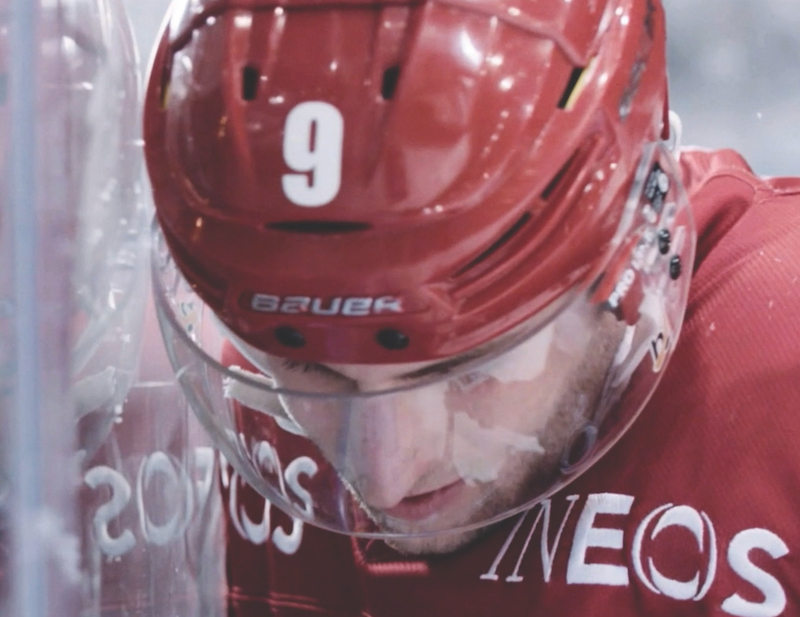
2017 – November
INEOS acquires Swiss football club FC Lausanne-Sport
2018 – April
INEOS TEAM UK competed for the America’s Cup in 2021. Now as INEOS Britannia it is the challenger of record for the 37th America’s Cup in 2024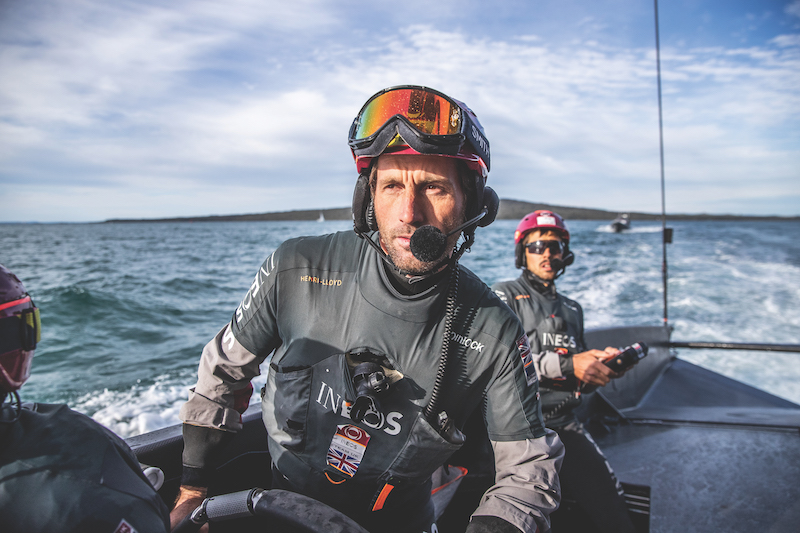
2019 – May
INEOS acquires cycling team TEAM Sky who become Team INEOS and then the INEOS Grenadiers (2021)
2019 – August
INEOS acquires French football club OGC Nice
2019 – October
INEOS supports Eliud Kipchoge’s record-breaking marathon as he becomes the first person to run a marathon in under 2 hours at the INEOS 1:59 Challenge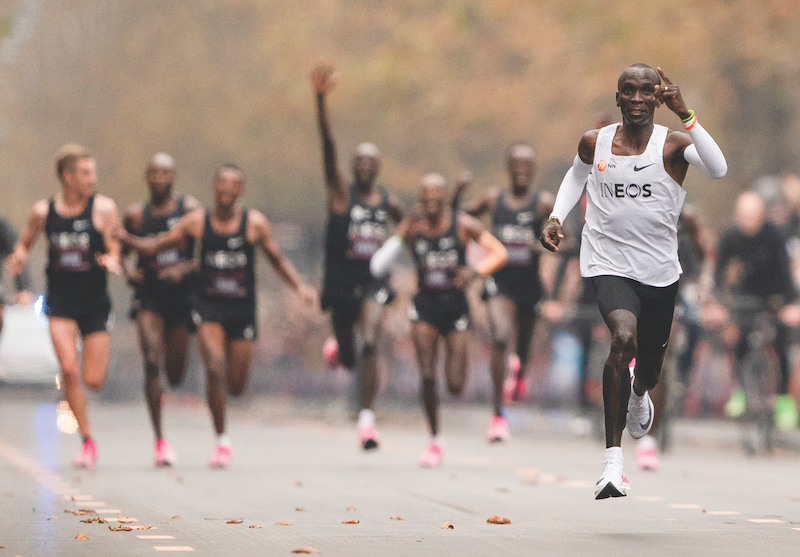
2020 – February
INEOS becomes Principal Partner to the Mercedes-AMG Petronas F1Team
2020 – December
INEOS joins Daimler and Toto Wolff as equal owners of the Mercedes-AMG Petronas F1 Team
2021– July
INEOS becomes Performance Partner to New Zealand Rugby and the Teams in Black
2021 – December
Dave Brailsford announced as Director of Sport at INEOS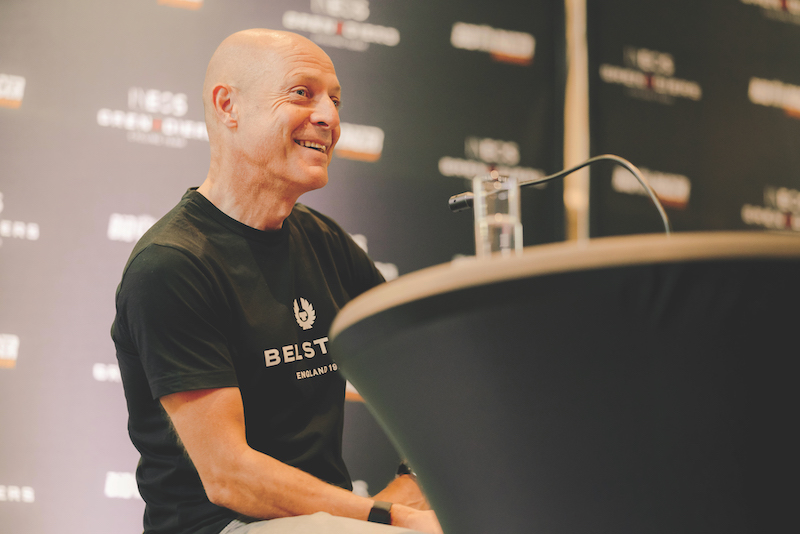
2022 – January
INEOS becomes Performance Partner to Eliud Kipchoge and the NN Running Team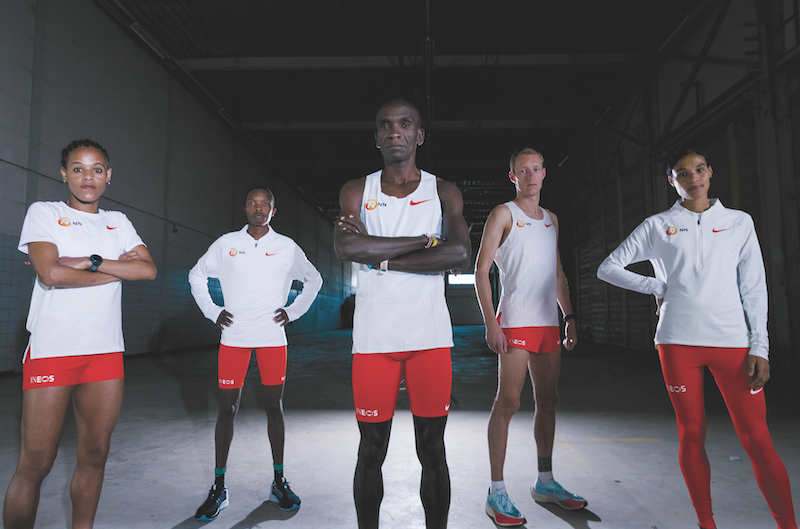
-
Running partner
The NN Running Team is the first professional team within the world of running and is delighted to formalise a long term performance partnership with INEOS.
INEOS is reuniting to help Eliud win a record-breaking, third, consecutive Olympic gold medal in the marathon at the Paris Olympics 2024.
Eliud Kipchoge made history in 2019 when he became the first man to run a marathon in under two hours at the INEOS 1:59 Challenge. As he crossed the line in Vienna, Austria, he said: “This shows no one is limited.”
Since then Eliud and INEOS have worked on various campaigns, but they have now signed a new performance partnership agreement to tackle new challenges together.

The knowledge and expertise of the team, who helped to make history on the streets of Vienna, are reuniting to help Eliud win a record-breaking, third, consecutive Olympic gold medal in the marathon.
The Kenyan athlete won golds at Rio in 2016 and Tokyo in 2021 and will be going for gold in Paris in 2024.
“To receive the support from such a great entity in sports is a huge boost to myself and the team,” he said.
INEOS’ backing, he said, also presented a huge opportunity for the greatest minds in sport to share their experiences and ideas.
“We have already changed the world together once,” he said.
Eliud will be working with Sir Dave Brailsford in his new role as Director of Sport at INEOS.
“Eliud is a once-in-a-generation athlete,” said Dave. “He has broken athletic boundaries that many felt impossible.
“Collaborating with Eliud, his performance team and INEOS on the 1:59 Challenge was a truly inspiring experience. The opportunity to come together again to tackle new ambitious challenges with Eliud and the wider running team is incredibly exciting.”
INEOS founder and chairman Sir Jim Ratcliffe, who was in the Prater Hauptallee on that historic day, said Eliud’s approach and mindset transcended sport.
“We have a great opportunity ahead of us to support not only his performance goals but understand how his approach can help others achieve theirs,” he said.
Long distance running may seem like a solitary pursuit. But in reality, it’s a team sport.
Many people worked behind the scenes to help Eliud become the first man to run 26.2 miles in under two hours, including 41 pacemakers.
Eliud and his Dutch-based NN Running Team will begin working with the other teams backed by INEOS, which include the All Blacks, Mercedes-AMG Petronas F1 Team, INEOS Grenadiers cycling team, America’s Cup Challenger of Record INEOS Britannia, OGC Nice and FC Lausanne-Sport.
Through their performance partnerships, INEOS has brought together some of the best minds and talent in sport to tackle sports' greatest challenges.
Under Dave, the teams involved are working together to identify opportunities for performance gains that can be shared and applied across the group.
“Across sports, we all face the same challenge, which is the need to continually improve,” said Dave.
‘To receive the support from such a great entity in sports is a huge boost to myself and the team’ – record-breaking Kenyan athlete Eliud Kipchoge
-
Chain reaction
A COUNTRY famed for producing the world’s best distance runners could soon be making real headway – in the world of cycling.
Eliud Kipchoge, the 5ft 4 Kenyan athlete who made history on the streets of Vienna by running a marathon in under two hours, has teamed up with INEOS to launch a cycling academy at the renowned Kaptagat camp where he trains.
“This is very great news,” Kevin Richie Preacher posted on Facebook. “I can foresee a Kenyan continental team coming up very soon.”
The INEOS Eliud Kipchoge Cycling Academy will be headed up by Valentijn Trouw, who was heavily involved in the record-breaking INEOS 1:59 Challenge in Austria in 2019.
Also involved will be the INEOS Grenadiers, one of the world’s most successful cycling teams.
Sir Dave Brailsford, INEOS’ Director of Sport and Team Principal of INEOS Grenadiers, said the new academy could help to develop new riders from Africa.
“We all know the talent is there,” he said. “We have seen it this year.”
In March Biniam Girmay became the first black African to win a World Tour race at Belgium's Gent-Wevelgem classic.
Two months later he made history as the first black African winner of a Grand Tour stage in the Giro d'Italia.
INEOS Chairman Sir Jim Ratcliffe recently visited the Kaptagat-based training camp.
“There is such exciting sporting talent, passion and ambition in Africa,” he said. “I am convinced that this partnership can do something truly different and unique for cycling – as well as for aspiring young African athletes.”
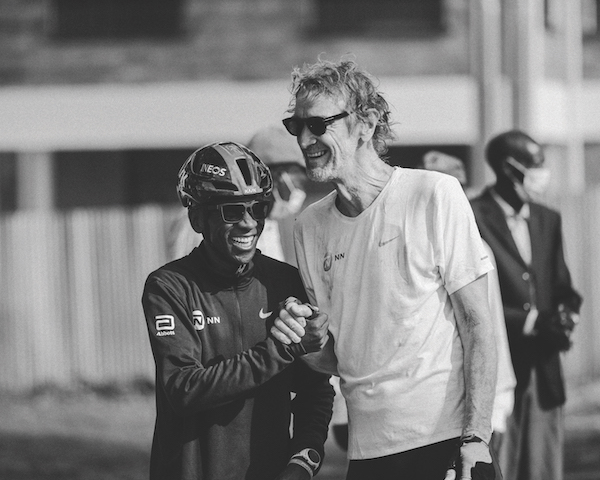
For more than 30 years Valentijn, who will work with the wider Kaptagat team, has identified and nurtured long-distance runners in Kenya, creating a pathway for them to compete on the world stage.
“Their passion, dedication and love of sport is a perfect fit with the INEOS Grenadiers’ spirit of giving it all to race and be your best,” said Dave. “Together I believe we can achieve something unique and important for cycling in Kenya, Africa, and the sport itself.”
Eliud, who will be seeking to make history in Paris 2024 by winning his third successive Olympic men’s marathon, said he was proud that the camp would no longer be a purely athletics-focussed training camp.
“The cycling academy is a very natural fit,” he said. “It’s got great potential to enable our young talented cyclists to make the next steps towards the top level of cycling.”
Valentijn said he, too, was excited at what could be achieved by working with INEOS and the INEOS Grenadiers cycling team.
“It is an opportunity to build a relatively new sport in Kenya and bring together our collective knowledge and insights from running and cycling for the benefit of the sport,” he said.
‘We all know the talent is there. We have seen it this year’ – Sir Dave Brailsford, INEOS’ Director of Sport and Team Principal of INEOS Grenadiers
INEOS and Eliud Kipchoge share a passion. They both believe that no human is limited. So it was only a matter of time before they linked up again.
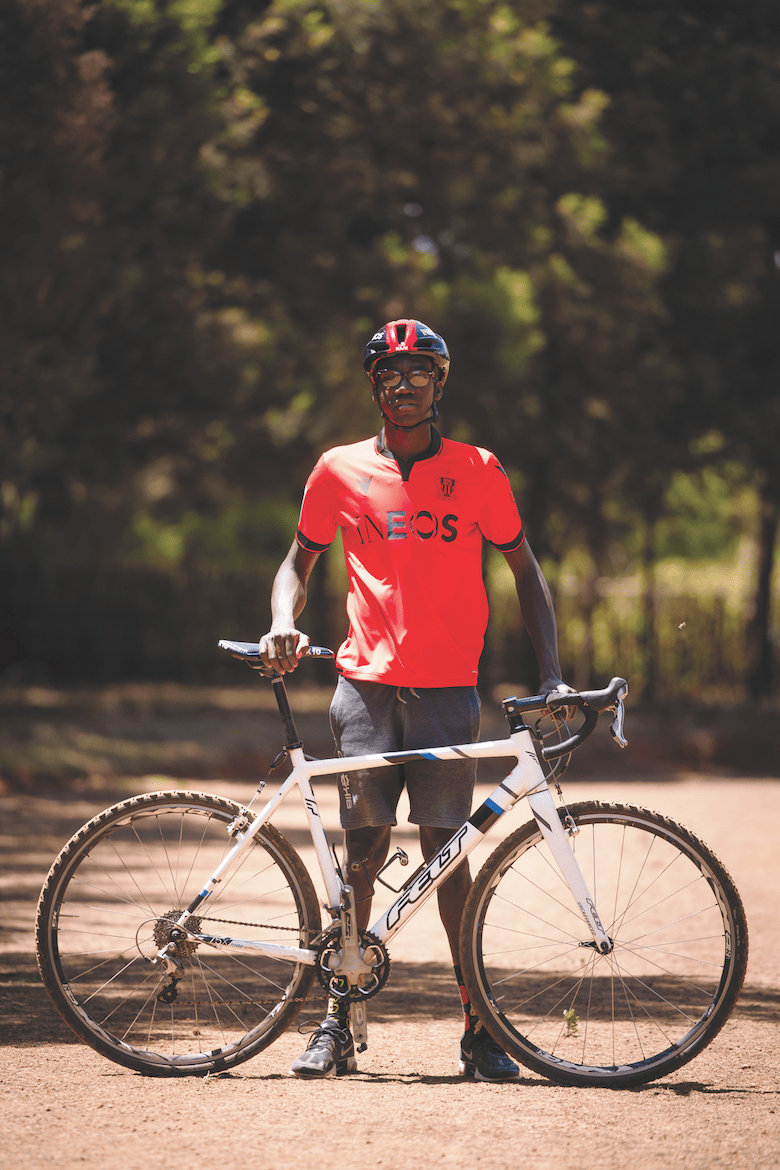
-
Programmes, partnerships and philanthropic donations
INEOS supports health, education, conservation and grassroots sport initiatives throughout the world.
“Through our giving we aim to make real impact big and small, whether that’s trying to find a solution to the global crisis of antibiotic resistance, improving the lives of children living in poverty, or supporting local community groups around our sites,” said Ursula Heath, Communications Manager INEOS.
Forgotten Forty
Giving headteachers the chance to make a difference
IT is estimated that more than four million children in the UK – over 40% of children in some regions – were living in poverty before the pandemic.
But with successive lockdowns and increases in the cost of living in the UK, the problem will only worsen.
Often their parents do not rely on state benefits. They are simply working all hours in low-paid jobs to make ends meet, leaving little time and money for non-essentials.
Following a successful pilot scheme involving 20 schools in some of the UK’s most deprived communities, 100 headteachers have now been chosen by INEOS to benefit from an annual £20,000 grant to spend on initiatives that could transform the lives of their most deprived children.
These initiatives are taking place and being evaluated, with learnings shared across the group of teachers.
Over three years, INEOS hopes to not only witness a meaningful, short-term impact on the lives of several children living in poverty, but also to gain insight into effective ways of tackling the negative effects of deprivation in primary schools, which can be shared and scaled.
CHILD poverty is nothing new. It has been a priority for successive UK governments for about 70 years. Attempts to tackle the problem, though, have focused on raising standards in schools. No one has tackled the root cause, which is what goes on beyond the school gates. Until now.
“INEOS’ decision to want to play its part in eradicating poverty represents a radical, new approach,” said Brian Padgett, a former deputy head who is working closely with four other ex-teachers on INEOS’ Forgotten Forty initiative.
The Forgotten Forty team – Brian, Elaine and John Wyllie, Sheila Loughlin and Elaine Crotty – were brought together in 2019 to consider what might be done differently to help tackle the impact of poverty on some of the most deprived children in the UK.
They came up with the concept of giving teachers a ‘blank cheque’ to try out new projects that might inspire children from poorer homes to believe in a better future – with the intention of INEOS learning what works, and what doesn’t.
All five members of the Forgotten Forty team know from experience that a child’s home life can seriously hamper his or her ability to do well in school and limit what they go on to achieve.
“The home underpins everything,” said Brian. “By helping families to cope and live better, the children will benefit.”
They also know the challenges facing headteachers whose primary schools care for some of the most deprived children in the UK, with their ability to help often constrained by limited and overstretched school budgets.
To help, INEOS has committed to giving £20,000 a year for three years to 100 primary schools serving some of the poorest communities in the UK – and is putting that funding into the hands of headteachers.
All INEOS wants is for them to use that money to help build a child’s confidence, develop their resilience, excite their curiosity about the world around them and inspire them to want to do well.
“The money is not there to send a child on a once-in-a-lifetime trip to Africa,” said Brian. “It’s about opening a child’s eyes to the world around them and showing them what is on their own doorstep.
“It could be as simple as taking them to a local museum or an art gallery that they have never visited before.”
The team is now working closely with all the 100 schools.
“Headteachers are not short of ideas,” said Elaine Wyllie, who founded The Daily Mile when she was headteacher of St Ninian’s Primary School in Scotland. “At the last count, they had come up with more than 600 initiatives.”
Headteachers know that not all learning takes place in the classroom, and that valuable lessons can be learned on school trips, after school and at weekends.
But they also know that children from poorer backgrounds are less likely to go on school trips, enjoy days out at the seaside, learn to play a musical instrument or join a sports club because their families simply cannot afford it.
‘The Forgotten Forty project is so flexible and is the best initiative I have ever been involved in. It has already had a huge impact on the community and will allow our children to build aspirations for the future’ - Nick Anderson, Headteacher Bede Primary School, Gateshead
The Forgotten Forty project’s goal is to allow headteachers to help their most deprived pupils enjoy a well-rounded education that children from wealthier homes take for granted.
“INEOS trusts us and we trust our teachers,” said John, who spent 32 years working in Scottish secondary schools.
The teachers have been given some rough guidance – they cannot spend it on staff salaries or capital projects – but apart from that, they have been trusted to spend it wisely.
Elaine Crotty, who specialised in early years’ education, said it didn’t matter if one of the teachers’ initiatives didn’t work.
“We are not expecting them all to work,” she said. “What we want to do is encourage teachers to take a risk and try something new. With any luck, some of the findings will be applicable to other schools too - whether or not they are currently part of the Forgotten Forty programme.”
The headteachers have also been introduced to one another so that they can share their ideas and successful initiatives.
INEOS will host an annual conference each year to allow them to build a network.
“Talking to each other has also helped them to realise they are not alone,” said Brian.
He said successive governments had blamed the underachievement of children from poor backgrounds on schools.
“They have wilfully ignored all the challenges stacked up against the children, their parents and local communities,” he said.
He said if INEOS’ intervention showed promising new ways of alleviating the effects of poverty, it could influence how schools spend their funding in future.
“The team are also hoping the initiative encourages other private donors to get involved with supporting primary schools,” said Brian.
-
The world at its feet
THE eyes of the world will be watching when the United States stages the World Athletics Championships for the first time. Hoping to attract some of that attention between July 15 and 24 will be The Daily Mile, which has been named as an official event supporter.
A film extolling the physical and mental benefits of this INEOS-backed initiative will be regularly shown in the stadium during breaks in the competition.
And Daily Mile banners will adorn the inside of Oregon’s Hayward Field, one of the greatest track and field stadiums ever built.

“We are hoping to encourage children in Oregon, the rest of the US and across the world to take part in The Daily Mile,” said Elaine Wyllie, who founded the initiative 10 years ago to help improve the fitness of pupils at her primary school in Scotland.
Today – with INEOS’ support – more than three million children around the world now regularly run, walk or jog The Daily Mile.
“As childhood becomes more sedentary than ever, we’re proud that The Daily Mile has helped those children get up and running because we know that the positive experiences we have at a young age shape habits for life,” said INEOS Chairman Sir Jim Ratcliffe.
About 2,000 of the world’s greatest track and field stars from more than 200 nations – along with thousands of fans from around the globe – will be heading for the USA this summer.
As part of the 100-day countdown to these historic Championships, children in Portland ran The Daily Mile for the first time as part of the World Wide Welcome Youth Relay.
Each leg of the relay will be dedicated to one of the global track and field teams who will be competing on US soil for the first time.
The Daily Mile has not only improved children’s fitness. It has also led to improved performance in the classroom.
“It is free, simple and effective and fits into the school day easily,” said Elaine.
Sarah Massey, CEO of the Championships’ local organising committee, Oregon22, LLC, said The Daily Mile and the World Wide Welcome Youth Relay were a perfect match, and would be working together to show new schools and community groups across Oregon what they could do – for free – to improve children’s fitness.
“Both programmes serve to encourage healthy activity in the younger generation, so we couldn’t be prouder to collectively build this into the lead-up to these World Athletics Championships,” she said.
-
Pride of Scotland
SCOTLAND was where The Daily Mile all started. So it was only right that Scotland should host the 10th anniversary party of that simple initiative that has become a runaway success with school children all over the world. And there to see it was former headteacher Elaine Wyllie, who Pagefounded it as a way to improve the fitness of her own pupils from St Ninian’s Primary School in Stirling.
“It has been an incredible journey so far,” she said.
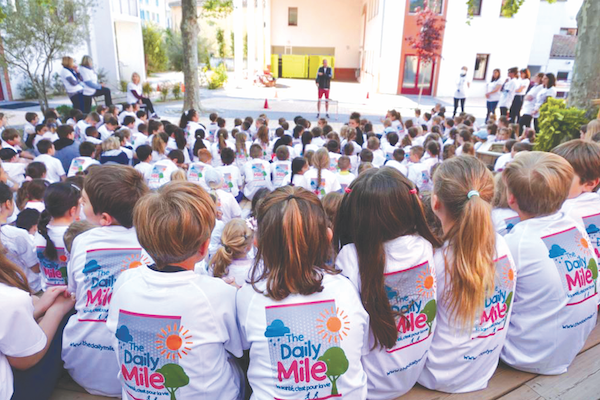
In Dundee, more than 800 children from six local primary schools took part in the largest-ever mass Daily Mile run in Baxter Park in front of distinguished guests.
At the same time, more than 260,000 children around the world took part in a virtual event – across 1,040 schools in 16 countries from Scotland to New Zealand.
“The fact that we were able to do this mass global event with hundreds of schools to celebrate our 10th birthday was a real testament to the enthusiasm behind the initiative,” said Elaine.
“It was a fantastic way to celebrate all we have achieved.”
She praised the children, teachers, schools and INEOS, which has helped to spread its appeal throughout the world.
Sir Jim Ratcliffe, Founder and CEO of INEOS, said INEOS had supported the Daily Mile for years because it shared Elaine’s passion.
“It’s a free, simple and effective way to improve children’s physical and mental wellbeing,” he said.
The initiative has enjoyed phenomenal success since it was founded 10 years ago.
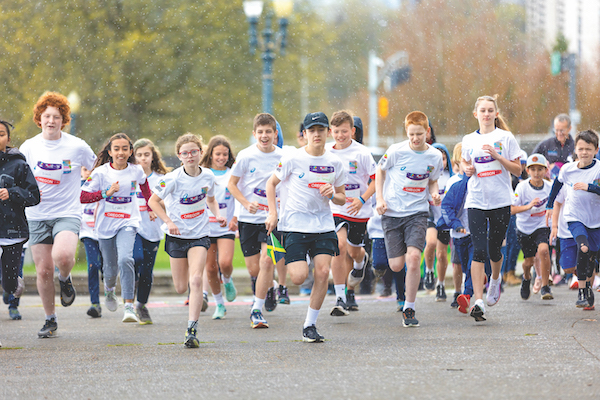
Today more than three million children across 14,000 schools in 87 countries globally are now running The Daily Mile.
In just 10 years The Daily Mile has become phenomenally successful, but all involved agree that there is still so much more that can be done. Hear from the experts, how - from a single class, in one school - this simple, but effective INEOS-backed initiative has already transformed millions of children's lives.
-
Six Rivers Project
Conservation methods begin to bear fruit as team continues to focus on the best ways to save this incredible species from extinction.
CONSERVATION methods – adopted by the INEOS-backed Six Rivers Project to try to save the Atlantic salmon – are beginning to bear fruit. Recent work has led to an improvement in the number of juveniles in the Sela river, which has long been a safe haven for this threatened species.
“The management of fishing pressure has also played a significant role here,” said Pete Williams, INEOS’ Director of Technology.
All fish caught must be released, and anglers are allowed to use light fishing tackle only.
“We are confident that by changing traditional fishing habits, we can enhance both the quality of all the rivers and improve the life of the fish that inhabit them,” he said.
Icelandic rivers are world renowned for their salmon fishing and attract enthusiasts from all over the world every year.
But if the salmon disappear, a source of income for those living in remote parts of North East Iceland vanishes too.
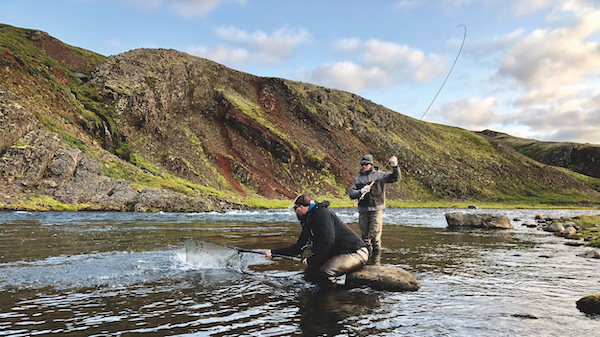
INEOS Chairman Sir Jim Ratcliffe has, for years, been working with the former Strengur Angling Club, now part of the Six Rivers Project.
They are working to ensure that profit from the world-class salmon fishing business will be reinvested in the conservation work to protect the species locally and beyond.
“In essence the fishing will provide the means to protect the local environment,” said Pete.
The Six Rivers Project, which was initiated by Jim, is working with experts from Iceland’s Marine and Freshwater Institute and Imperial College London on a ‘multi-faceted’ conservation programme.
Salmon ladders have been built to allow the salmon to reach new spawning grounds further up the rivers.
Eggs have been planted in new areas.
Adult fish have been relocated to new parts of the rivers, where competition for food may not be as fierce.
And botanists have been planting native vegetation along the riverbanks which has increased the food supply in the rivers.
The team also tagged 1,000 smolts – maturing salmon – so that scientists could track and monitor their behaviour.
From that research alone, they discovered that half of smolts in the Vesturdalsa died before they even reached the sea – and very few, just 13 in 1,000, of the tagged smolts returned to spawn.
“All these conservation measures have set a new standard in Iceland,” said Pete. “But there is much more to do in this long-term project.”
The team, though, remain confident that, with careful management, they can reverse the decline in the wild Atlantic salmon which used to thrive in Iceland – and provide insights for protecting the species elsewhere.
“It is important that we share our findings with other groups around the world,” said Pete, who is co-ordinating the academic research. “Conservation resources are limited so we need to ensure we’re not unnecessarily repeating work done elsewhere.”
As part of the team’s desire to share their findings, INEOS hosts an annual Six Rivers International Conference in Reykjavik every year.
In September 2021 academics from Canada, Norway, England, Iceland and beyond met to compare research.
“Ultimately, we have the same aim,” said Pete. “We all want to leave the environment and habitat in better shape than we found it.”
Experts from Iceland’s Marine and Freshwater Institute and Imperial College London are working on the ‘multi-faceted’ conservation programme as part of the Six Rivers Project, which was initiated by INEOS Chairman Sir Jim Ratcliffe.
‘Our conservation measures have set a new standard in Iceland’ - Pete Williams, INEOS’ Director of Technology

-
INEOS Oxford Institute
The accidental discovery by Alexander Fleming of a mouldy petri-dish in 1928 kickstarted a 20 year journey to develop the world’s first mass-produced antibiotic. But little progress has been made since the 1980s to develop new drugs to combat the growing ‘silent pandemic’ of antimicrobial resistance.
Now scientists at the Ineos Oxford Institute have helped to identify a potential future drug that could extend the life of ‘last resort’ antibiotics.

IN January 2021 INEOS committed £100 million to Oxford University amid fears that a growing, ‘silent pandemic’ of antimicrobial resistance would end modern medicine as we know it. A year on, scientists, based at the Ineos Oxford Institute, have made a promising discovery.
Carbapenems are vital, often ‘last resort’, antibiotics that are used to treat serious infections, such as sepsis and pneumonia, when all others have failed.
Despite that, some bacteria have found a way to render those carbapenems useless by producing enzymes called metallo-betalactamases (MBLs), leading to a rise in superbugs.
But new collaborative research, conducted by scientists from the Ineos Oxford Institute and several institutions across Europe, has found that indole carboxylates, a new class of enzyme blockers, can stop those enzymes working, leaving the antibiotic free to attack and kill bacteria, such as E. coli, in the lab and in infections in mice.
The researchers first screened hundreds of thousands of chemicals to see which would attach tightly to the metallo-beta-lactamases enzymes to stop them working – and which didn’t react with any human proteins.
By zooming in to take a closer look at how they work, the researchers found that these potential drugs attached to the enzymes in a completely different way to any other drugs because they copied how the antibiotic behaved with those enzymes.
The researchers then chemically changed aspects of the drugs to make them as effective as possible and tested them, in combination with carbapenems, against multi-drug resistant bacteria in both dishes in the lab and in mice.
“The potential new drugs, in combination with carbapenems, were found to be many times more potent at treating severe bacterial infections than carbapenems alone,” said Professor Schofield.
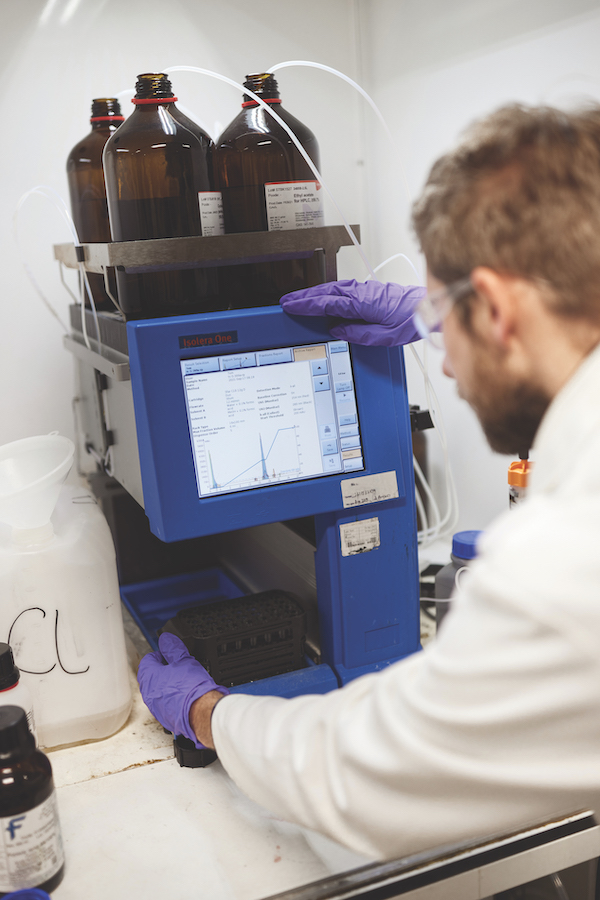
Antimicrobial resistance is currently responsible for about 700,000 deaths every year, but it threatens to get much, much worse, with fears that 10 million people could die every year by 2050 from common infections.
“It is a massive problem because collectively we haven’t been making enough new clinically useful antibiotics,” he said.
“As a society we must find ways both to make new antibiotics and protect the ones we have. The alternative is that routine modern medicine will be disrupted in a manner simply too horrendous to conceive.”
INEOS’ £100 million, which was used to set up the Ineos Oxford Institute, will support research into the growing resistance to antibiotics.
The money will enable more than 50 researchers to address the overuse and misuse of antibiotics, collaborate with other global leaders and develop new drugs for people and animals.
“With the fantastic support we have received from INEOS, we can replicate the latest drug discovery programme within the institute for multiple different bacterial targets and applications,” said Professor Tim Walsh, Academic Lead (Microbiology) at the Ineos Oxford Institute.
This latest research is the culmination of years of work and is a long way from being a proven solution.
But if indole carboxylates can be developed, tested and made into safe, human medicines, they could extend the effectiveness and lifespan of some of our current antibiotics and save lives all over the world.
Professor Tim Walsh said the discovery also proved that academia, given the space to create, could produce something amazing.
“That’s what we have seen here,” he said. “And we hope to make many more similar promising discoveries as the institute grows over the years.”
“This clever, Trojan Horse trick allowed these potential drugs to be highly effective against a very wide range of MBL-producing superbugs,” said Professor Christopher Schofield, Academic Lead (Chemistry), at the Ineos Oxford Institute at the University of Oxford.
Scientists, based at the Ineos Oxford Institute, have made a promising discovery which could extend the life of 'last resort' antibiotics
‘This clever, Trojan Horse trick allowed these potential drugs to be highly effective against a very wide range of MBL-producing superbugs’ - Professor Christopher Schofield, Academic Lead (Chemistry), at the Ineos Oxford Institute at the University of Oxford
Penicillin
The discovery of Penicillin and its purification into the first antibiotic in the early 1940s was one of the greatest medical advances of the 20th century.
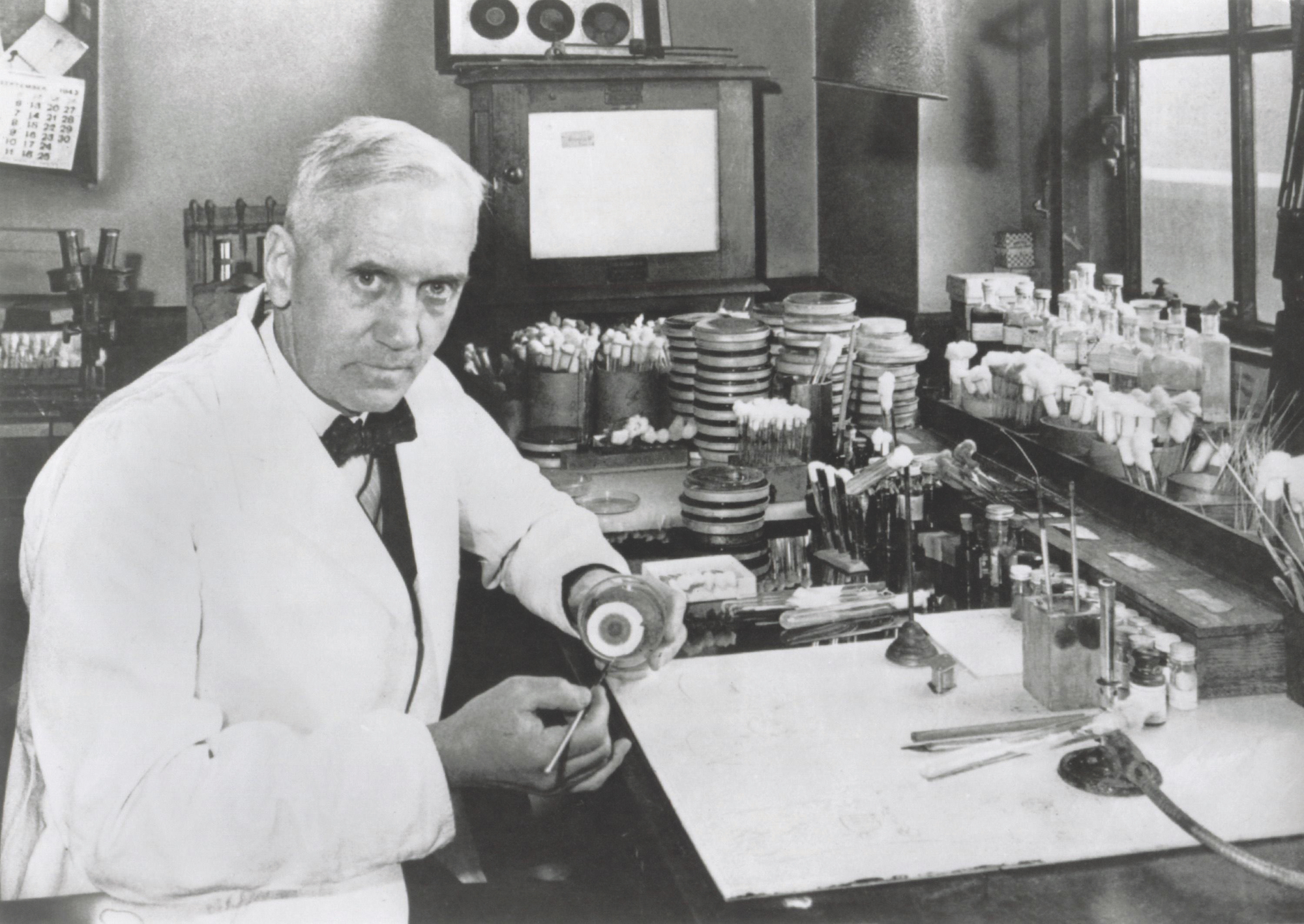
Antibiotics changed the course of medical history, saving countless lives at the end of the Second World War, making childbirth safe for the first time in human history and allowing the creation of all modern surgery and cancer treatment that we benefit from today.Following the discovery of Penicillin there was a “golden age” of antibiotic discovery lasting several decades.
Sadly, this era has finished, and we are left with a dwindling stock of medicines that are becoming ever less effective as bacteria naturally develop resistance to their actions.
Society needs to continue working hard to keep hold of these medical gains, and avoid returning to a pre-antibiotic era when a simple cut could be fatal.
The Ineos Oxford Institute for Antimicrobial Research was established to advance the search for solutions to one of the biggest public health challenges of our time. Researchers are working in the lab, in the field and with the public to discover new ways to prevent and treat drug resistant infections.







